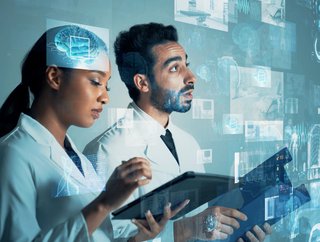Top 10 ways AI is improving the healthcare industry

AI was key in the fight against COVID-19. Soon after the pandemic was declared, the World Health Organisation (WHO) signalled that AI could be an important technology to manage the crisis caused by the virus.
As it was able to help with detection and diagnosis during the pandemic, many technologists and healthcare professionals were keen to get this technology applied throughout healthcare organisations as it had well and truly proved its worth.
Valued at US$10.4bn in 2021, the global artificial intelligence (AI) in the healthcare market is expected to grow at a compound annual growth rate (CAGR) of 38.4% from 2022 to 2030.
Here we look at the top 10 ways this technology can drive the industry forward.
10 - Keeping patients well before treatment is needed
One large potential benefit for AI is keeping people healthy so they do not need a doctor or don’t need to see a doctor as they may have previously needed. This is because the use of AI and the Internet of Medical Things (IoMT) in consumer health applications is already helping people.
Different types of AI-enabled technology, such as wearable devices, encourage healthier behaviour and help with the proactive management of a healthy lifestyle. By putting consumers in control of health and well-being, AI can help reduce the number of avoidable visits to doctors or hospitals.
On top of this, the data generated by AI devices means healthcare professionals can provide more personalised guidance to patients so they keep well at home.
9 - Creating more independent end-of-life care with AI
As technology and healthcare improve, people are living longer than ever before. Many technologists are working on AI-enabled robots to help with elderly care to remove the need for hospital visits and care homes.
By helping people remain independent for longer, robots can revolutionise end-of-life care. AI combined with the advancements in humanoid design is enabling robots to go even further in terms of care. Now, they are able to have ‘conversations’ and other social interactions with people, helping to keep ageing minds sharp.
8 - AI and improving melanoma screening
In various studies across the world, AI is proving its worth when it comes to screening for different cancers. Looking specifically at melanoma, AI company, V7 is part of the iToBoS mole scanning project which aims to build a new diagnostic tool for the early detection of melanoma. V7’s technology is used to apply tags to every patient and lesion to accurately represent both demographics and 16 lesion types.
7 - Harnessing AI for patient risk identification
In healthcare, predictive analytics can process and evaluate enormous amounts of historic and real-time data to create valuable forecasts, predictions and recommendations on anything from individual patient care to wider public health. By assessing tens of thousands of data points, predictive analytics can predict a number of things from an individual's risk of developing illnesses to their likelihood of coming back into a hospital with an infection.
In doing so, predictive analytics can help healthcare professionals become more proactive with their treatment plans and potentially reduce the need for expensive and time-consuming surgeries or treatments.
6 - How AI can improve the employee experience
For healthcare workers, AI can also play an invaluable role as it can complete a number of manual tasks, freeing up workers' time and reducing burnout.
Through automation, AI can help remove or minimise time spent on routine, administrative tasks, which can take up to 70% of a healthcare practitioner’s time. Automation in this capacity reduces the amount of time needed to complete tasks as well as reduces the chances of human error, more effectively organising data and structuring it for use in decision making. It also makes files and records more available through digitisation, again streamlining potentially tiresome processes.
5 - Transforming radiology with AI
As discussed previously, AI is can be used with cancer screening, and this is not exclusive to melanoma. AI-powered systems are already being used in computer-aided cancer detection, they can classify brain tumours and reduces the tumour classification time to about three minutes. The technology can also be applied to detect hidden fractures, recognise breast cancer and detect neurological abnormalities.
On top of this, AI can reduce the workload of radiologists by completing more monotonous tasks and free up clinicians' time to complete tasks that require human interpretation.
4 - Treatment, robotics and AI
Health records help providers identify chronically ill individuals who may be at risk of an adverse episode, but combined with AI, clinicians can take a more comprehensive approach to disease management, better coordinate care plans and help patients to better manage and comply with their long-term treatment programmes.
On top of this, robot technology is proving invaluable in surgeries. Robots have been used in medicine for over 30 years in different applications from simple laboratory robots to highly complex surgical robots. Some robots can aid a human surgeon or execute operations by themselves, improving the quality of care for patients and surgery environment for clinicians. In addition to surgery, robots can be used in hospitals and labs for repetitive tasks, in rehabilitation, physical therapy and in support of those with long-term conditions.
3 - AI-driven drug discovery
When it comes to drug discovery, AI has the potential to make processes faster and more cost-effective, with the hope of reducing the time a new drug needs to reach the patient. AI can sort through masses of information and data from tissue or blood samples from patients who have the disease and others who don't. This could help researchers look into new compounds likely to target those proteins. During the coronavirus pandemic, AI was successfully used to identify potential drugs that could be used to treat Covid-19.
Last year, Google’s Deepmind AI system AlphaFold has found a solution to how proteins fold into their 3D structure, which may create new opportunities in structure-based drug design.
2 - AI-powered clinical surveillance
By refining the use of AI for clinical surveillance, hospitals can proactively identify a range of health conditions with greater speed and accuracy. AI-powered clinical surveillance can save lives and reduce costs for conditions that have previously proven resistant to prevention.
AI can analyse millions of data points to predict patients at-risk for healthcare-associated infections, enabling clinicians to respond more quickly to treat patients before their infection progresses, as well as prevent spread among hospitalised patients.
According to the World Health Organisation, by 2030 healthcare systems could anticipate when a person is at risk of developing a chronic disease, for example, and suggest preventative measures before they get worse. This development has been so successful that rates of diabetes, congestive heart failure and COPD (chronic obstructive heart disease).
1 - How AI can improve the patient experience
Patient satisfaction is a top priority for many hospitals and healthcare organisations. With machine learning and (AI) patient data can become invaluable, providing insights into where improvement in the patient journey is needed. Machine learning systems provide an opportunity for hospitals to improve overall health outcomes, as patient satisfaction is strongly associated with greater compliance and increased treatment adherence, according to researchers.
AI can also provide more personalised and convenient healthcare experiences. Chatbots used by healthcare organisations can also boost patient satisfaction. It seems that many people are happy for AI to be applied as back in 2019, a Pegasystems survey of 2,000 healthcare consumers found that almost half (42%) of patients said they are comfortable with their doctors using AI to make healthcare decisions.






